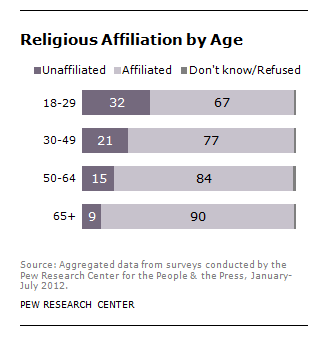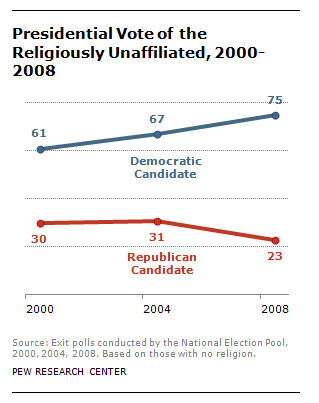Why are Millennials less religious? It's not just because of gay marriage
A younger generation's religious views aren't shaped by a single hot-button issue


It's no secret that young Americans aren't as religious as their elders. A survey released Wednesday by the Public Religion Research Institute suggests that part of that rift may be attributed to a perceived anti-gay bias in organized religion.
Among those who have abandoned their childhood religion and are now religiously unaffiliated, one quarter say anti-gay teachings factored into their decision to go faithless. Among Millennials in the religious turned irreligious camp, almost one third said the same.
At first blush, that would appear to suggest clear causation: stuffy old anti-gay religious dogma is spooking all the hip youngsters. But while there is certainly a link between the two, it is an overly simplistic analysis that glosses over a host of reasons that Americans — and particularly younger ones — are losing their religion.
The Week
Escape your echo chamber. Get the facts behind the news, plus analysis from multiple perspectives.

Sign up for The Week's Free Newsletters
From our morning news briefing to a weekly Good News Newsletter, get the best of The Week delivered directly to your inbox.
From our morning news briefing to a weekly Good News Newsletter, get the best of The Week delivered directly to your inbox.
Let's start by digging a little deeper into PRRI's survey results. While 31 percent of Millennial religion-droppers said anti-gay teachings were a factor in their decision, only 14 percent called it a "very important" reason they went faithless. And fully two thirds of Millennials who abandoned religion said their decision had very little or nothing at all to do with religion's position on homosexuals.
So what else is at play here?
Americans have been growing less religious for some time now. About one fifth of the nation is either atheist, agnostic, or religiously unaffiliated, according to a 2012 Pew survey, which categorizes that demographic as the "nones." Young adults are less devout than any other age bracket; nearly a third of them are religiously unaffiliated. Notably, they are also less religious than previous generations were at this point in their lives.

As Pew pointed out, that generational divide isn't the result of just one or even a few factors. Rather, it coincides with a general "softening of religious commitment" in the nation as a whole, with religious institutions holding much less influence in Americans' daily lives.
A free daily email with the biggest news stories of the day – and the best features from TheWeek.com
Americans attend church less, are more likely to doubt the existence of God, and are less likely to take the Bible literally than ever before. What that means for Millennials is that they're growing up in less religious households, and are thus less liable to embrace religion themselves.
At the same time, atheism and agnosticism have gradually become more commonplace and acceptable. Only 18 percent of Americans said they would vote for an atheist presidential candidate in 1958; a majority now say they would do just that. There are promotional atheism billboards all over the country, including one that went up near the site of the Super Bowl this year. There's even a hotline to help people "recover" from religion.
On another front, religion has become increasingly politicized in recent years; its perceived anti-gay bias is just one manifestation of that trend. As political scientists Robert Putnam and David Campbell tell it in their book, American Grace, the religious right secured a foothold in modern American politics by railing against abortion, contraception, premarital sex, and other supposedly sinful things including, yes, homosexuality. (The PRRI survey lumps all religions together, but given Christianity's predominance it's worth spotlighting.) That politicization, they argue, then turned nonreligious voters off of the GOP and religion in general. Indeed, religiously unaffiliated voters have been trending more Democratic for the past 30 years, with a spike in the past decade.

"While the Republican base has become ever more committed to mixing religion and politics," Putnam and Campbell wrote, "the rest of the country has been moving in the opposite direction."
Returning to Millennials, the religious positions mentioned above are also largely anathema to their prevailing beliefs. Furthermore, the outright hostility to science from some on the right — on global warming, evolution, and even something as seemingly benign as vaccines — only further impugns religion's credibility with younger voters. It should be no surprise then that solid majorities of Millennials describe Christianity as "hypocritical" and "judgmental."
To be sure, organized religion's perceived views on and treatment of homosexuals are undoubtedly pushing away some Millennials, who as a group are more supportive of gay marriage than the general public. But that's only a small piece of a much bigger picture.
Jon Terbush is an associate editor at TheWeek.com covering politics, sports, and other things he finds interesting. He has previously written for Talking Points Memo, Raw Story, and Business Insider.
-
 In Okinawa, experience the more tranquil side of Japan
In Okinawa, experience the more tranquil side of JapanThe Week Recommends Find serenity on land and in the sea
-
 The Iberian Peninsula is rotating clockwise
The Iberian Peninsula is rotating clockwiseUnder the radar We won’t feel it in our lifetime
-
 San Francisco tackles affordability problems with free child care
San Francisco tackles affordability problems with free child careThe Explainer The free child care will be offered to thousands of families in the city
